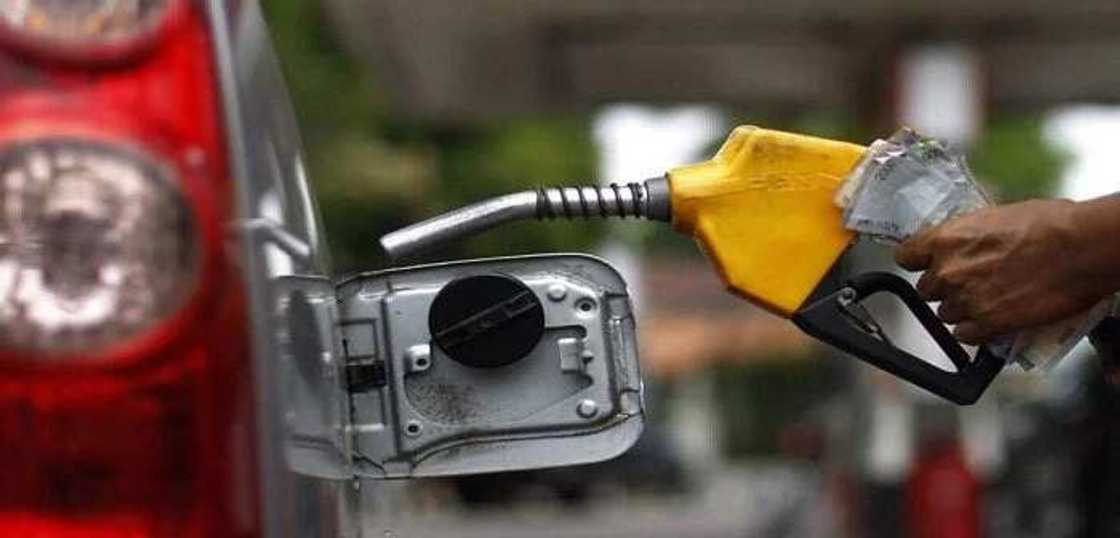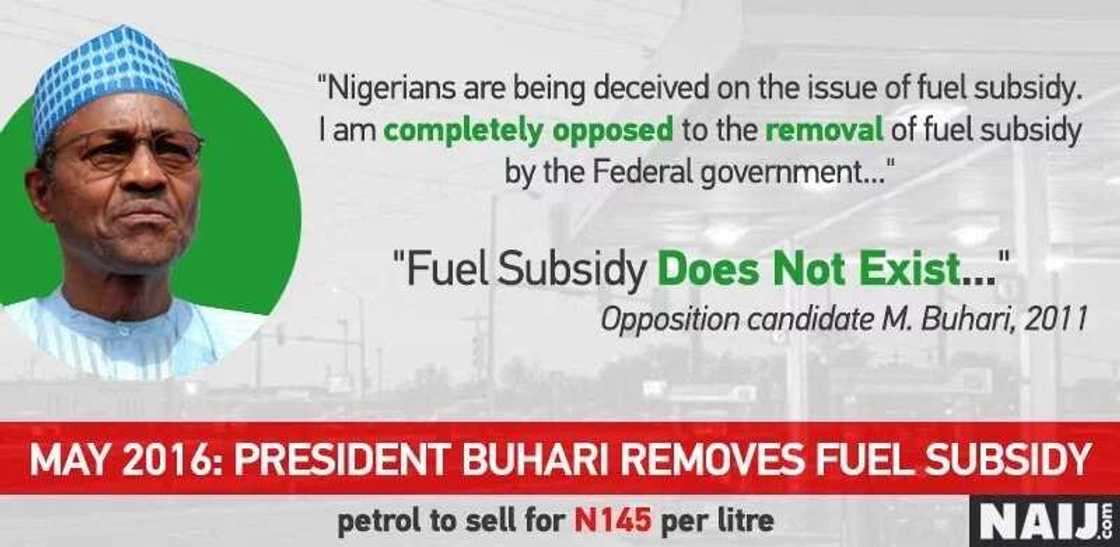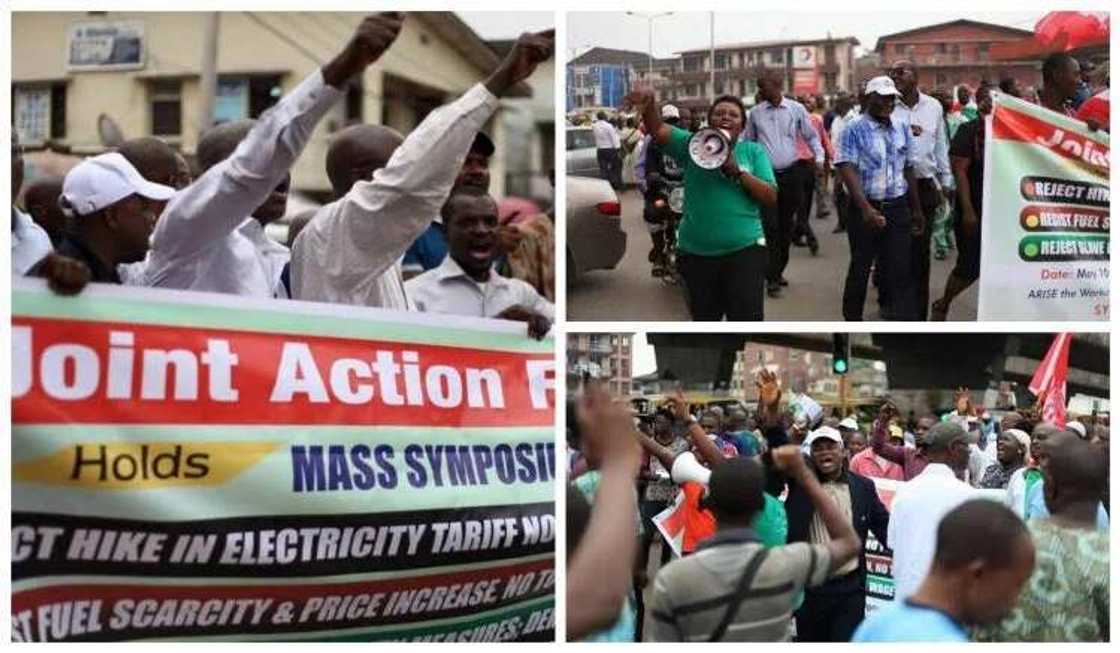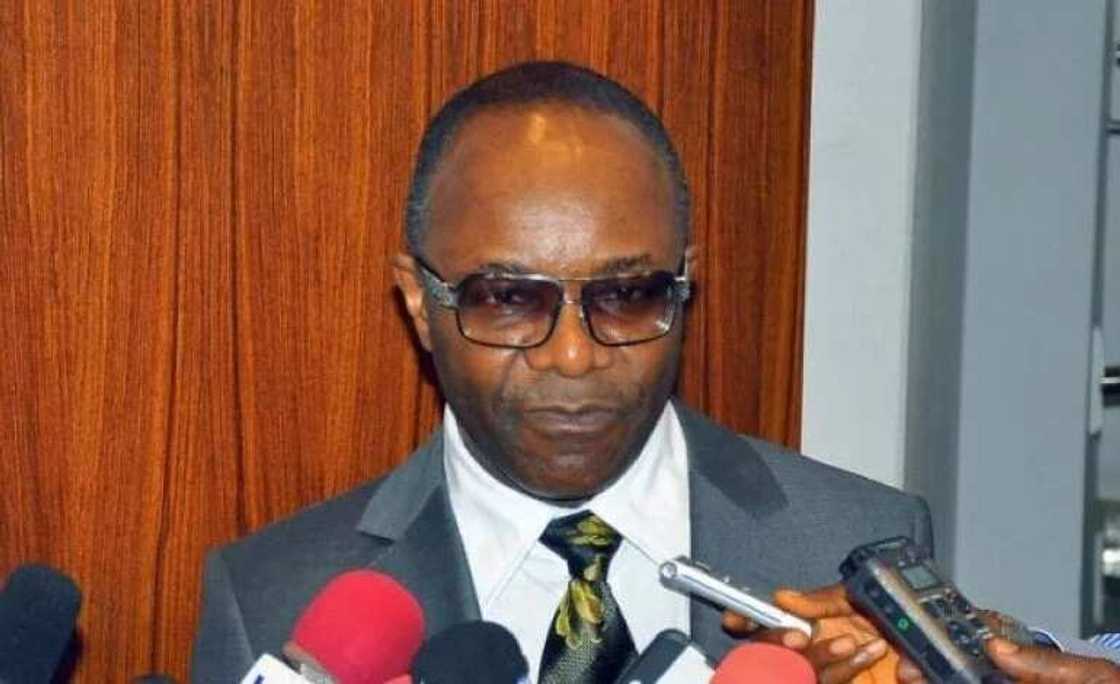The good, bad and ugly sides of the fuel subsidy
Legit.ng analyses the good, bad and ugly sides of the fuel subsidy which was removed by the Nigerian president, Muhammadu Buhari. The removal has generated different reactions from citizens.
Mr Chukwudi Odinkalu is a regular traveler on the Onitsha-Lagos road. He deals in electronics at Alaba international market, Lagos. He also has a shop in Onitsha; an extension of his electronics shop in Lagos. As a businessman he has a vehicle, but when transporting his electronics from Lagos to Onitsha he makes do with public transport.
As usual, he uses any of the transport companies operating on the Onitsha-Lagos road. He has done this for years. He pays the usual fare from Lagos to Onitsha. He pays for himself and for the space his goods occupy on the bus. At times, his goods take over almost two rolls and he pays without blinking an eye.
But following the increase in the price of fuel, he miscalculated. He thought the fare would be as usual and went to the park with the same cash he was used to taking. He was embarrassed to discover that the fare had sky-rocketed. But luckily for him, he had his ATM card, and he had to quickly run to the nearest machine to withdraw the balance.

That was in January 2012 when the former president Goodluck Jonathan took Nigerians by surprise when he attempted to remove the fuel subsidy. Nigerians fought against Jonathan's move.
There were massive protests across the nation. Lagos was the worst hit. Ojota, Oshodi and other areas of Lagos became home to massive protests which were allegedly sponsored by the then opposition All Progressives Congress (APC) against the Jonathan government.
READ ALSO: Feature: Nollywood superstars in retrospect
Many slept and woke, cooked and ate at Ojota, while the unlucky ones died while protesting against the removal of the fuel subsidy by Jonathan’s government.
Many easterners who traveled from Lagos to the east and others who travelled from other states to Lagos were stranded and there was a wild uproar across the nation, forcing Jonathan to review the subsidy removal in 2012. President Muhammadu Buhari and his party members lambasted Jonathan for the move, saying it was anti-people and should be reversed.
But in May 2016, President Muhammadu Buhari surprised Nigerians when he removed the subsidy; a policy he had vehemently stood against in 2012.
However, it transpired that the minister of state for petroleum, Ibe Kachikwu, and the 36 state governors were the brains behind the removal of the subsidy, which thereby increased the fuel price from N87 to N145.
Apparently Buhari was concerned about the effects of a fuel price hike on the average Nigerian, and hence he had strongly resisted the proposal by Kachikwu for several months, but succumbed reluctantly in May when he was presented with the stark reality of the dropping oil earnings and the state of the foreign reserves.
The pressure from state governors, whose allocation from the Federal Accounts Allocation Committee (FAAC) has been dropping, was also a significant factor that swayed the president to append his signature to the subsidy removal proposal.
An official of the federal government, who asked not to be named, said Buhari would not have agreed to the new fuel price regime if he had not been presented with compelling evidence that Nigeria’s declining foreign earnings from oil would be further devastated, unless independent oil marketers and other interested parties are encouraged to import fuel.
The increment spurred the recent strike action by the leadership of the Nigerian Labour Congress (NLC).
However, the industrial action was marred by the non-participation of relevant unions like the National Union of Petroleum and Natural Gas Workers (NUPENG) and the Petroleum and Natural Gas Senior Staff Association of Nigeria (PENGASSAN).
It was also marred by factionalism in the NLC, leading to few states participating in the strike action.
It is necessary to look critically at the subsidy and examine the pros and cons of subsidy removal. For Sen. Shehu Sani, APC- Kaduna Central, the removal of the fuel subsidy was unacceptable because it will lead to great hardship.
He said: “I am from a civil rights movement. We struggle against the removal of oil subsidy. I remain so; I believe that fuel needs to be subsidized from the very fact that if it is removed, it will lead to untold hardship for the common man.
“Most importantly, we need to get our refineries back on track, we also need to ensure that fraudulent companies and personalities do not exploit our position on subsidy to defraud the nation.”
The senator said the subsidy was very necessary for Nigeria because most nations were giving subsidies to their citizens, “and my position remained like that.”

Also, Senator Dino Melaye, representing Kogi West in the Senate, criticised the removal of the fuel subsidy, hinging his argument on the overall effect on the Nigerian masses.
At the removal of the subsidy he gave President Buhari seven days to reverse the policy or he would organize the mother of all rallies against Buhari to compel him to reverse the policy.
Melaye, who participated actively in the #OccupyNigeria protests which forced the government of former President Goodluck Jonathan to shelve the idea of removing the fuel subsidy, accused Buhari’s administration of going against the campaign promises of the ruling All Progressives Congress (APC).
READ ALSO: Niger Delta Avengers: Why the war remains unwinnable
On his Facebook page he wrote: “My sincere advice is for the National Chairman of our party is to suggest that the federal government immediately reverse the announced increase in the pump price of premium motor spirit.
"If after 7days there is no reversal, I will mobilize Nigerians from all walks of life for the mother of all protest. This is not what we promised Nigerians. The time is not right and the negative effects will be unbearable. A word is enough for the wise.”
Other proponents of the fuel subsidy are of the view that the subsidy protects the vulnerable groups in the society.
They say subsidies ensure that the most vulnerable among the population do not fall through the cracks which are the consequences of economic and social policy decisions.
Proponents also say that since it is a universal practice, it should continue. To the average Nigerian, Nigeria is not the only country providing subsidies to its people. Countries all over the world provide diverse forms of subsidies.
In Europe, farm subsidies have been the most controversial, yet they have been maintained to shore up the incomes of farmers. According to Africa’s Pulse brochure, over half of all African countries have some subsidy in place for fuel products, and these subsidies consumed, on the average, 1.4 per cent of Gross Domestic Product (GDP).
It is also the view of the average Nigerian that subsidies are not entirely a waste as Nigerians are made to believe. Subsidies are taxes spent on taxpayers and so they are not a waste.
The problem with the subsidy, however, has to do with unintended beneficiaries benefiting from the package. This calls for better targeting and not total withdrawal of the support.
Also, it is believed that the fuel subsidy cushions workers from otherwise high transport fares. Without fuel subsidies, transport fares would be higher than ordinary Nigerians can bear, taking up a substantial percentage of the average worker’s monthly income.
Fuel subsidies therefore put money in workers’ pocket and reduce expenses, especially on transport. Subsidies keep food prices at affordable levels. Because 98% of food consumed in urban centres is hauled by road transport, fuel subsidy withdrawal will certainly lead to an increase in food prices.
In such a scenario, the percentage of the worker’s income spent on food will go up if wages remain as they are, leaving the worker poorer. A petroleum subsidy therefore puts food on the table of millions of Nigerians.
Farmers and farmers’ groups have complained much about the rising cost of production; of fertilizer and other expenses.
At the inception of this administration, subsidies on agriculture were removed leaving farmers at a disadvantage in an ever more competitive world. Increases in road haulage fares as a result of fuel subsidy withdrawal will increase farmers’ cost of transporting their produce to market centres and thereby reduce their disposable income.
Two of the most essential utilities, water and electricity, depend a great deal on petroleum products. This is because while the bulk of Nigeria's power generation is from gas and crude oil, water is distributed to consumers by pumps that are driven by electricity and diesel power.

Therefore, an increase in the prices of gas and diesel will spark off an automatic increase in electricity and water tariffs.
Fuel subsidy provides safety nets for the ordinary Nigerian. Under the social contract, people elect governments to take care of their needs and welfare. This is why providing safety nets for the marginalized has become the business of responsible governments.
This is how nations are stabilized and foster cohesion. Subsidies are therefore inevitable in carrying out the functions of government.
But as against the mass action that followed the threat to the subsidy in 2012, many Nigerians now seem to have thrown their weight behind the move which many of them fought vehemently at that time.
Governor Nasir El-Rufai of Kaduna state and Adams Oshiomhole of Edo state both fought against the removal in 2012 but now are the main proponents of the removal in the administration of President Muhammadu Buhari.
Many reasons have, however, been adduced for the removal of the subsidy and the support it is gathering from a wide spectrum of Nigerians.
Governor Ifeanyi Okowa of Delta state also said that all 36 Nigerian governors are in support of the fuel subsidy removal and the eventual increase in the price of fuel. He said the reforms are necessary in the oil sector, maintaining that though the reforms would cause immediate pain to the average Nigerian, the long terms benefit cannot be quantified.
“If the refineries succeed, Nigeria will succeed and different states will succeed because the importation of fuel has impacted negatively on the revenue of government.
"All the state governments are in support of the liberalisation of the downstream oil sector of the economy because we are caught in the web as the price of oil is very low and there is no foreign exchange to continue to import fuel.
“I sympathize with all Nigerians. We did not anticipate this situation. I believe the federal government will find ways to cushion the effects of the liberalisation but, above all, there are lessons to be learnt from the situation. We need to diversify our economy as quickly as possible.”
Ahmed Bola Tinubu, national leader of the All Progressives Congress (APC), has said that Buhari’s action was in the best interests of Nigerians.
He said the government has to allow the market forces to determine the price of the product because of its long term benefits to the people. He argued that while the government’s policy of fixing prices was done with good intentions, it became obvious that it had been overtaken by corruption.
He said that though the government had yielded to the call to allow the forces of demand and supply to determine the price of petrol, it had no intention of adopting a completely hands-off approach, as it intends to keep a close watch on how prices are determined to prevent unjust enrichment and collusion hiking prices unnecessarily.
He said many people are against the removal of the subsidy because it has been going for a long time and people are already used to it.
However, he said the policy had to go because it no longer served the people as its intended benefits had been hijacked by profiteers.
“The decision to end the subsidy was hard but it was also inevitable. It had distorted into a system where wrongdoers benefited at the expense of the innocent. The bogus supplier was paid for supplying nothing while you sweated in long lines for fuel that was never there. The smuggler secreted fuel across the border while our economy crossed the border into fuel scarcity,” he said.
He added that the subsidy regime also prevented investment and growth in the sector, as most investors, instead of putting funds into the construction of refineries, rather settled for the importation of fuel, due to the uncertainty that pervaded the subsidy regime.
The issue of fuel subsidy has become a touchy political issue and has polarized the country down the middle, with organised labour in the vanguard of those opposed to its complete removal.
Those calling for the removal of the subsidy insist that its discontinuance will attract investors to the downstream sub-sector of the oil industry.
But, critically, the management of the entire subsidy scheme needs to be looked into as it has become an unmitigated scam. For instance, in 2013, ten oil marketers were prosecuted before the Federal High Court for a N2.7bn subsidy fraud. N1.5bn was paid for fuel products that were never supplied.
READ ALSO: Revealed! The truth behind the scarcity of tomatoes in Nigeria
A forensic audit into the NNPC by Pricewaterhouse Coopers(PwC) revealed that the subsidy scheme is a scam as many oil marketers were reported to have received multiple payments.
A total of 128 companies were engaged in fuel importation under the old regime, thus providing an opportunity for the abuse of the system. Statistics from government show that since 2012, the country has lost on average N971bn yearly to fuel subsidy fraud.
A thorough investigation of the subsidy scheme is therefore imperative. All the same, removal of the subsidy when the nation’s refineries are not functional might lead to unpleasant consequences. Government must look at these issues and be mindful of the plight of the vast majority of the people who the subsidy removal will affect.
Senator Ben Murray Bruce, representing Bayelsa Central in the National Assembly, said that if the whole idea of the fuel subsidy is to pass on benefits to the poor, then we must all agree that it is not working.

Fuel scarcity has long been a major problem in Nigeria
According to him, the benefits of the subsidy are going to importers of fuel, oil majors and upper- and middle-class Nigerians.
He argued: “Our people in the north-east and the Niger Delta have been buying petrol at black market prices for decades. Of what use is fuel subsidy to them? Is this not part of the reason why they sometimes feel alienated from Nigeria?
“In the most recent data released by the International Monetary Fund (IMF), the Democratic Republic of Congo is rated the poorest nation in the world with a per capita income of less than $400.
"But the truth is that if you isolate the north-east of Nigeria from the rest of Nigeria and you compare their per capita income to that of the Congo DRC, it will be clear that the north-east of Nigeria is the poorest part of planet Earth.
"Fuel in the north-east and the Niger Delta goes for N300 per litre while fuel in Ikoyi in Lagos sells for N87! Now tell me, who are we subsidizing the fuel for, the rich or the poor?"
In order to cushion the effect of the removal on the poor masses, he is of the view that the federal government should gather all the providers of mass transport and register all of them in a central database, noting that the federal government should find out the unit cost of transporting an individual passenger.
Then the federal government should sign an agreement that it would pay the increased cost of a unit of transport that would ensue following the removal of the fuel subsidy.
In this manner, he argued, the federal government will be able to deregulate the downstream sector of the oil and gas industry while at the same time providing relief for the poorest Nigerians from the effect of the fuel price increase.
But Senator Bruce’s view has earned him the anger of some Nigerians. Cairo Okeke said: “Senator Ben should tell Nigerians why a simple subsidy scheme should nearly bring Nigeria to her knees.
He said: “Ben thinks that once the fuel subsidy is jettisoned, it can be replaced with transport subsidy and Nigerian will thereafter live happily forever is common sense gone awry. He is wrong because a new subsidy scheme will suffer the same fate. It will still be invaded by the same locust. We need therefore to address what went wrong with the fuel subsidy arrangements."
Amador Kester, a business mogul, also said the subsidy business has never helped the masses in any way and it is better to drop it like a hot potato, and that whether you deftly call it deregulation or subsidy removal does not matter.
He also said that deregulation should go the full mile and not just a thousand yards or half measures that could bring it back through the back door; it should permanently be removed.
However, Obe Amadi is of the view that the fuel price hike is for the benefit of the Nigerian government.
He said: “I have always known that all the increases in fuel price is not about subsidy. It is simply the federal government's idea of making money. But why would a country decide to use over 75% of its revenue to pay salaries of public servants, and turn to fuel price increase and laying off of workers as a way of making money?”
READ ALSO: Zimbabwe: Feeling the broil of insurgency
Investigations have revealed that the Nigerian oil market is fraught with corruption and fraud. The scale of corruption revealed in the oil sector is horrifying. The information released to the public about the oil money is usually opaque and loaded with myriad of numbers that baffle the ordinary Nigerian.

In the administration of former President Goodluck Jonathan, different government ministries gave conflicting figures on how much oil Nigeria produces, suggesting that they cannot agree on what amount Nigeria produces, or they do not know, and hence whatever is released by the body concerned, that becomes the official figure.
A former senior official of the World Bank, Oby Ezekwesili, reckons that $400 billion of Nigeria’s oil revenue has been stolen or misspent since the country’s independence in 1960.
Nigeria is certainly Africa’s biggest oil-producer and, according to British Petroleum, Nigeria has the world’s ninth-largest gas reserves. But the corrupt tendencies of Nigerian leaders, especially those in charge of the oil industry, have reduced the country's economy to an all time low.
A report on Nigeria’s oil exposed a fraud amounting to $6.8 billion over the subsidy of petrol imports.
When Okonjo Iweala was in office as finance minister, she brought to book several fuel marketers for overcharging the government for refined products they never delivered.
Naming and shaming them has worked: some are said to have paid back the money. But so far the crackdown has not affected fraudulent politicians in the system.
A Petroleum Industry Bill has been in the works for 15 years, intended to overhaul the industry, make it more transparent, improve regulatory institutions and fiscal policies, and bring everything up to global standards.
But the law has been stuck between government and parliament for five years, holding back many billions of dollars in investment. Oil majors are loathe to inject cash in the industry because they do not know how much tax they will have to pay.
The bill, signed and sealed by Jonathan and his cabinet, is back in parliament. Jonathan wanted it speedily passed, though its original aims have been watered down, and many oil companies say its monetary terms will deter investment.
The federal government's oil arm, the Nigerian National Petroleum Corporation (NNPC), still controls every aspect of the industry, from exploration and production to refining, pipelines and petrochemicals.

The NNPC has been judged one of the world’s least transparent oil companies. A joint report by Transparency International, a Berlin-based anti-corruption monitor, and the Revenue Watch Institute in New York judged the NNPC to have the worst record among the 44 national and foreign companies it examined.
A recent external audit said the NNPC was accountable to no one. It has been called a “slush fund for the government”. The directors there seem free to do what they deem fit and hence, divert funds and fuel at will without being made to answer questions from anyone.
In 2015, prior to his troubles with the code of conduct tribunal, Senate President Bukola Saraki said fake fuel subsidy operators are responsible for one of the most massive frauds in Nigeria. Inappropriate fuel subsidy management annually results in drainage of $2 billion from the treasury.
Saraki said the Muhammadu Buhari government should urgently remove the fuel subsidies and return to normal deregulated business in the fuel market. He also accused the Jonathan government of giving import licenses to 82 shady companies with the sole purpose of draining money from the Nigerian budget.
He estimated yearly losses of $2 billion due to the activity of these bogus firms.
“No matter what is happening now, if you go back to look at it, the major issue that dwindled us was the subsidy management,” Saraki said, noting that “we are talking of about a minimum of over $32 billion wasted on subsidy for the last five to six years.”
Source: Legit.ng

